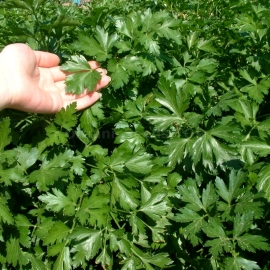
«Ukrainian Bogatyr» - Organic Parsley Seeds
1.14 €
Parsley has a long and colorful history, being well known in many cultures. Myths and legends abound concerning this herb, making it the symbol of such widely varying things as death, victory, and life.
-
Heirloom Parsley «Ukrainian Bogatyr»
Parsley has a long and colorful history, being well known in many cultures. Myths and legends abound concerning this herb, making it the symbol of such widely varying things as death, victory, and life.
One colonial superstition connecting parsley with death held such power that many farmers refused to grow this herb at all. In Italy and Greece, flat leaved parsley such as Ukrainian Bogatyr grows wild in the rocks and has been used for both culinary and medicinal purposes for generations.
Ukrainian Bogatyr Parsley Germination
Most gardeners sow parsley seed indoors to give the plants a head start; soak the seeds overnight, then plant them 1/4" deep and keep them at 65-70 degrees F. Because parsley has a notorious habit of slow germination, don't expect to see sprouts for 3-5 weeks. Keep the soil evenly moist. Transplant the seedlings when the average outdoor soil temperature reaches 60 degrees F, spacing them 6" apart in full sun or partial shade. Parsley also grows well as a container plant. Parsley has shallow roots, and should not be allowed to dry out for long. Mulch to help conserve moisture and control weeds.
Harvesting Ukrainian Bogatyr Parsley
Harvest the leaves as needed, taking the large outer leaves first and removing at least 10" of stem with the leaves to keep the plant healthy. The whole plant can be harvested at once, cutting it off just above ground level; more leaves will grow. Use immediately or freeze to preserve freshness. Ukrainian Bogatyr flat parsley tends to have stronger flavor than the curled types.
Saving Ukrainian Bogatyr Seeds
Though most varieties of parsley can survive below zero temperatures when mulched well, another method of overwintering is to dig up the entire plant, cut down the stems to 1", and plant it in sand; keep it in a 32-40 degrees F location until spring replanting. Watch the developing seed heads carefully, since they tend to shatter easily; pick each one as it becomes dry and mature. Additional drying time may be needed. Clean the seed by rubbing the heads through a screen or shaking them. Store the seed in a cool, dry place for up to 4 years.
